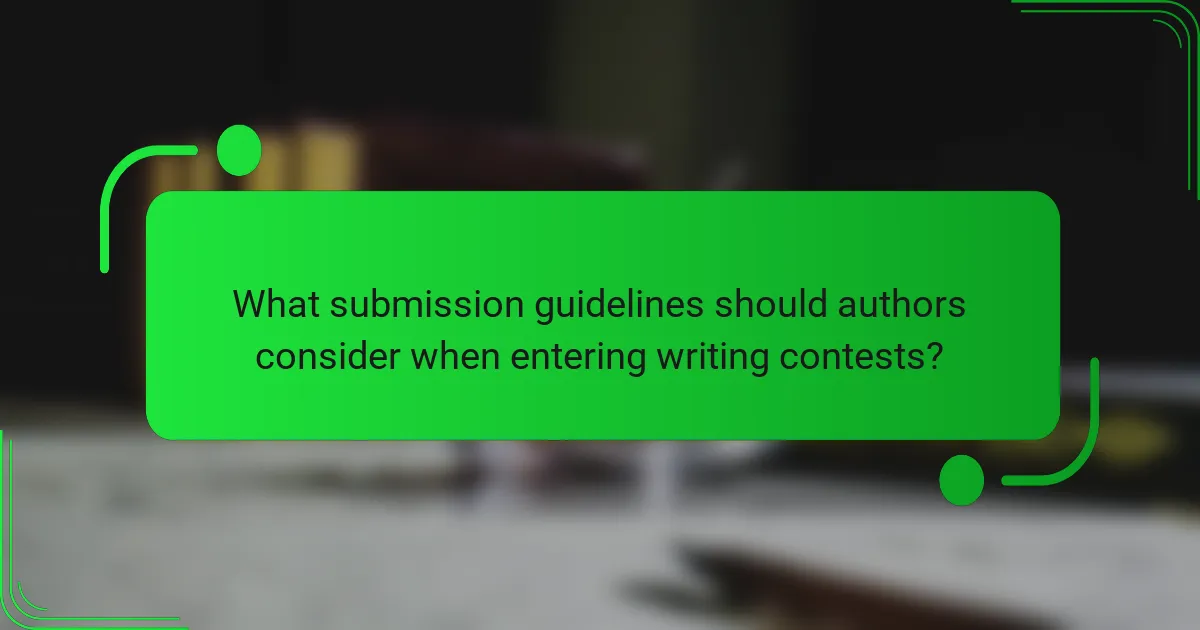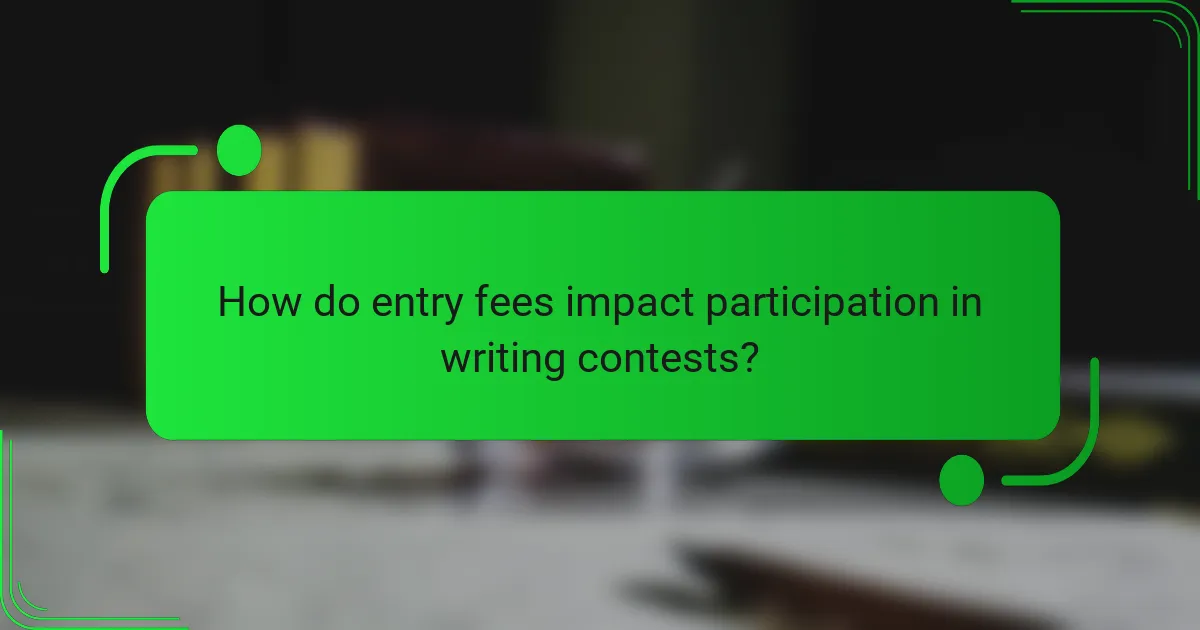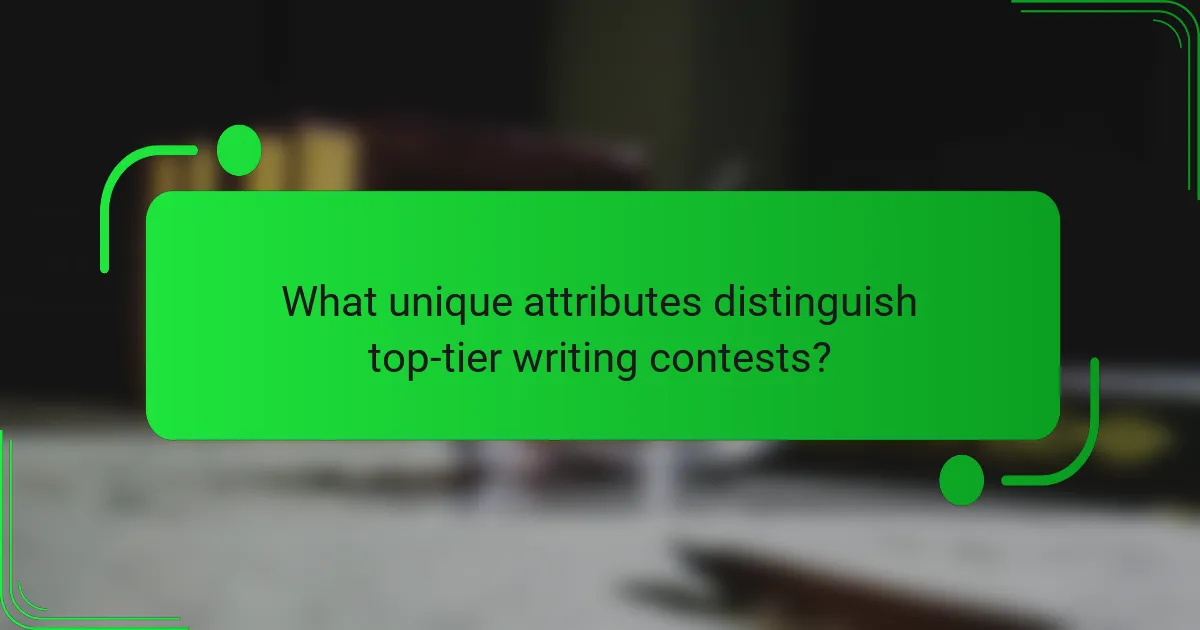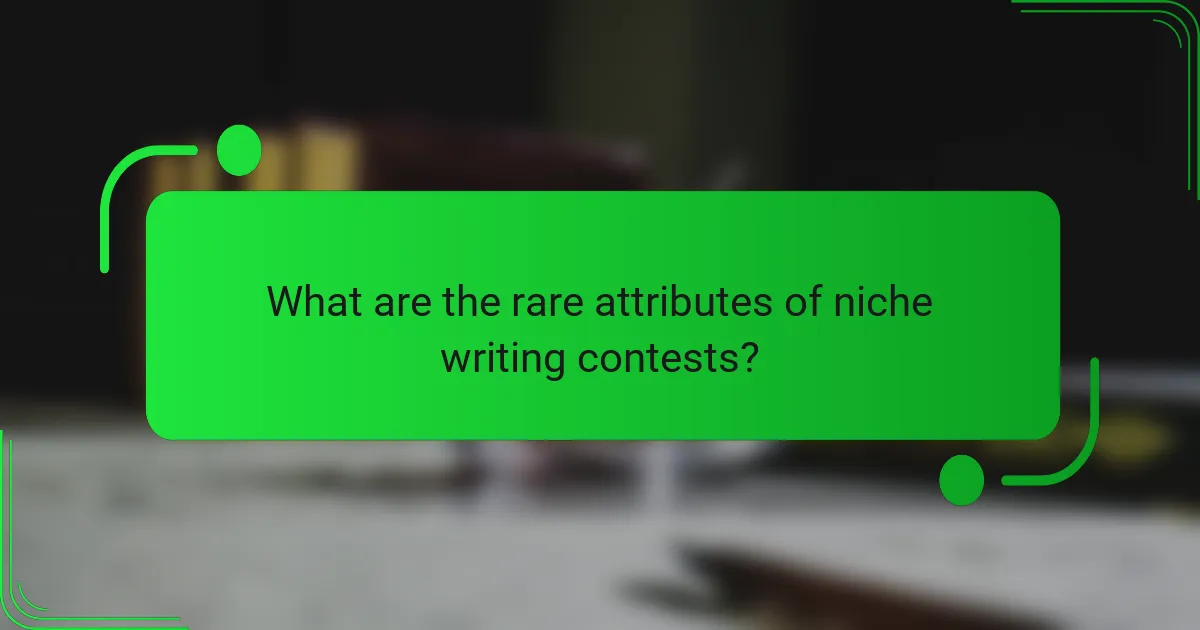Writing contests offer aspiring authors valuable exposure, feedback, and potential publication opportunities. This article explores the benefits of participating, essential submission guidelines, accepted formats, and the impact of entry fees. It also highlights unique attributes of top-tier and niche contests that can enhance a writer’s chances of success. Understanding these elements can significantly improve your contest experience and outcomes.

What opportunities do writing contests offer to aspiring authors?
Writing contests provide aspiring authors with exposure, feedback, and potential publication opportunities. They allow authors to showcase their work, connect with industry professionals, and gain recognition. Many contests offer monetary prizes or scholarships, enhancing their appeal. Additionally, winning or placing in contests can boost an author’s credibility and open doors to networking opportunities.
How can winning a contest enhance an author’s career?
Winning a contest can significantly enhance an author’s career by providing recognition, networking opportunities, and potential financial rewards. Success in writing contests often leads to increased visibility and credibility within the literary community.
Recognition from a contest can attract the attention of agents and publishers, opening doors for future publishing opportunities. Networking with fellow writers and judges can foster collaborations and mentorships. Additionally, many contests offer monetary prizes or publication opportunities that can support an author’s writing endeavors.
Moreover, winning or placing in a contest can boost an author’s confidence, motivating them to pursue larger projects. It can serve as a pivotal moment that propels their career forward, establishing them as a serious contender in the literary field.
Which writing contests are most recognized in the literary community?
The most recognized writing contests in the literary community include the Pulitzer Prize, National Book Award, and the Man Booker Prize. These contests offer significant visibility and prestige, enhancing authors’ careers. Submission guidelines vary by contest, often requiring original works, adherence to specific genres, and deadlines. For example, the Pulitzer Prize accepts entries from publishers, while the National Book Award focuses on books published in the previous year. Winning or being shortlisted can lead to increased readership and opportunities in the literary field.

What are the key benefits of participating in writing contests?
Participating in writing contests offers numerous benefits, including enhanced visibility, skill development, and networking opportunities. Writers can gain recognition, receive constructive feedback, and potentially earn monetary prizes or publication opportunities. These contests often encourage creativity and motivate writers to refine their work. Additionally, they provide a platform to connect with other writers and industry professionals.
How do writing contests provide feedback and improve writing skills?
Writing contests provide valuable feedback and enhance writing skills through critiques from judges and peer reviews. Participants receive insights on strengths and weaknesses, fostering growth. This feedback often highlights unique attributes of writing, such as voice and style, which are essential for improvement. Additionally, engaging in contests encourages writers to refine their work and adhere to submission guidelines, promoting discipline and focus. As a result, writers can develop a deeper understanding of their craft and elevate their overall writing proficiency.
What networking opportunities arise from entering contests?
Entering writing contests creates valuable networking opportunities with fellow writers, industry professionals, and potential mentors. Participants can connect through workshops, online forums, and social media platforms associated with the contests. These connections can lead to collaborations, feedback on work, and insights into the publishing industry. Additionally, winners and finalists often gain visibility, which can attract further networking opportunities and professional relationships.

What submission guidelines should authors consider when entering writing contests?
Authors should carefully review submission guidelines for writing contests to ensure compliance. Key considerations include word count limits, formatting requirements, eligibility criteria, and deadlines. Adhering to these guidelines enhances chances of success and demonstrates professionalism. Additionally, some contests may have unique attributes, such as specific themes or genres, which must be respected. Understanding these elements can significantly impact an author’s submission outcome.
How can authors prepare their submissions to meet contest requirements?
Authors can prepare their submissions by carefully reviewing contest guidelines, ensuring adherence to word limits, formatting requirements, and submission deadlines. Researching previous winners can provide insights into successful styles and themes. Tailoring content to the contest’s specific audience or theme enhances relevance. Proofreading for grammar and clarity is essential for a polished presentation.
What common mistakes should authors avoid when submitting?
Authors should avoid several common mistakes when submitting to writing contests. First, failing to follow submission guidelines can lead to disqualification. Ensure you adhere to formatting, word count, and other specified requirements. Second, submitting work that has not been thoroughly edited can diminish your chances of success. Take the time to revise and polish your piece. Third, neglecting to research the contest can result in submitting to the wrong audience or theme. Understanding the contest’s focus will help tailor your submission effectively. Lastly, missing deadlines is a critical error; always submit your work on time to avoid disqualification.

Which formats and genres are most commonly accepted in writing contests?
Writing contests commonly accept formats such as poetry, short stories, essays, and novel excerpts. Each genre may have specific guidelines regarding length and theme. Poetry often allows for various styles, while short stories typically range from 1,000 to 5,000 words. Essays may focus on personal narratives or argumentative topics. Novel excerpts usually require a specific word count, often between 5,000 and 10,000 words, and may emphasize character development or plot. Understanding these formats enhances a writer’s chance of success in competitions.
How do genre-specific contests differ in their submission guidelines?
Genre-specific contests often have distinct submission guidelines tailored to their themes. These guidelines can include word count limits, specific formatting requirements, and unique eligibility criteria based on genre. For instance, poetry contests may require line breaks and stanzas, while short story contests focus on narrative structure. Additionally, some contests might specify themes or prompts relevant to their genre, guiding submissions towards a particular direction. Understanding these nuances is crucial for writers aiming to enhance their chances of success in these competitions.
What are the emerging trends in writing contest formats?
Emerging trends in writing contest formats include increased use of digital platforms, diverse submission methods, and thematic competitions. Many contests now leverage social media for engagement and promotion. Additionally, hybrid formats combining traditional and modern elements are gaining popularity, allowing for wider participation. Contests focusing on specific genres or social themes are also on the rise, encouraging unique narratives and perspectives.

How do entry fees impact participation in writing contests?
Entry fees can significantly reduce participation in writing contests. High fees may deter potential entrants, particularly emerging writers with limited budgets. Conversely, reasonable fees can enhance participation by attracting a broader range of applicants. Contests with no fees often see higher submission rates, indicating that financial barriers impact engagement levels. Balancing entry fees with the potential benefits, such as exposure and feedback, is crucial for contest organizers.
What are the differences in entry fee structures across various contests?
Entry fee structures for writing contests vary significantly based on factors like contest prestige, prize offerings, and submission requirements. Typically, fees range from free to several hundred dollars.
| Contest Type | Entry Fee Range | Prize Amounts | Submission Format |
|———————–|———————|———————–|————————|
| Local Competitions | Free – $30 | $100 – $1,000 | Online/Paper |
| National Contests | $10 – $50 | $1,000 – $5,000 | Online |
| International Awards | $20 – $100 | $5,000 – $20,000 | Online/Paper |
| Themed Contests | Free – $50 | $500 – $2,000 | Online |
| Student Competitions | Free – $25 | $100 – $500 | Online |
Are there free writing contests worth entering?
Yes, there are free writing contests worth entering. These contests provide valuable opportunities for writers to showcase their work, gain recognition, and potentially win prizes. Many reputable organizations and literary magazines host these contests, offering various genres and themes.
Benefits include exposure to a wider audience, feedback from judges, and the chance to network with other writers. Submission guidelines typically require original work, adherence to word limits, and specific formatting. Researching contests with established credibility can enhance your chances of success.

What unique attributes distinguish top-tier writing contests?
Top-tier writing contests distinguish themselves through unique attributes such as prestigious judges, significant prize money, and exclusive publication opportunities. These contests often provide feedback from industry professionals, enhancing participant growth. Additionally, some contests feature niche themes or genres, attracting specialized audiences and fostering community engagement.
How do contest judges influence the outcome and credibility of contests?
Contest judges significantly shape contest outcomes and their credibility through their expertise and evaluation criteria. Their decisions can enhance the perceived value of contests by ensuring fairness and quality. Judges’ backgrounds influence the selection process, as their unique attributes, such as industry experience and literary knowledge, impact the evaluation of submissions. Additionally, consistent judging standards foster trust among participants, encouraging more writers to engage in contests. This dynamic ultimately affects the contest’s reputation and the opportunities it provides to emerging writers.
What role does prize money play in attracting participants?
Prize money significantly attracts participants to writing contests by providing financial incentives. Higher prize amounts can increase competition and draw more submissions, enhancing the contest’s prestige. Additionally, substantial rewards can motivate writers to invest time and effort into their entries. This dynamic creates a more vibrant and diverse pool of talent, ultimately benefiting the contest organizers by elevating the overall quality of submissions.

What are the rare attributes of niche writing contests?
Rare attributes of niche writing contests include specific themes, limited participant pools, and unique judging criteria. These contests often focus on unconventional genres or formats, such as flash fiction or poetry inspired by art. Additionally, some contests offer exclusive prizes like mentorship opportunities or publication in prestigious journals, setting them apart from mainstream competitions. These distinctive features attract particular audiences and foster diverse literary expressions.
How do contests focused on specific themes or topics engage unique audiences?
Contests centered on specific themes engage unique audiences by appealing to their interests and passions. These contests create a sense of community among participants who share similar values or experiences.
Thematic contests often attract niche writers, fostering creativity and innovation in submissions. For example, a contest focused on environmental issues may draw writers passionate about sustainability, enhancing the quality and relevance of entries.
Additionally, these contests provide targeted exposure for participants, as judges and sponsors often align with the contest’s theme. This alignment can lead to valuable networking opportunities and potential publication avenues for writers.
Ultimately, themed writing contests serve as platforms that connect like-minded individuals, driving engagement and enhancing the overall writing experience.
What is the significance of international writing contests?
International writing contests offer significant opportunities for writers to gain recognition, showcase their talent, and connect with a broader audience. These contests provide valuable feedback, enhance writing skills, and can lead to publication opportunities. Winning or placing in a contest can elevate a writer’s credibility and open doors to networking with industry professionals. Additionally, many contests offer monetary prizes or grants, which can support a writer’s career development.
What practical tips can authors follow to increase their chances of winning?
To increase their chances of winning writing contests, authors should focus on refining their submissions, understanding the contest guidelines, and engaging with the writing community.
First, thoroughly read the submission guidelines to ensure compliance with formatting and theme requirements. Next, invest time in editing and revising work to enhance clarity and impact, as polished writing stands out. Additionally, seek feedback from peers or writing groups to gain fresh perspectives.
Participating in multiple contests can also improve visibility and experience. Lastly, network with other writers and contest judges, as establishing connections can lead to valuable opportunities and insights.



